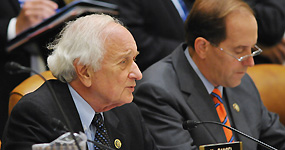
美国国会正接近以其所称的操纵汇率为由,出台惩罚中国的措施。众议院一个重要的委员会已投票通过推进相关立法,而这可能加剧美中经济紧张局势。
分管贸易的筹款委员会(Ways and Means Committee)周五在两党一致支持下通过了汇率法案,为该法案下周提交众议院全体投票表决铺平了道路。
该法案将允许美国方面对从中国和其它国家进口的商品计算反补贴税时,使用估算的汇率低估幅度。法案的措辞最近已经过修改,以降低其在世贸组织(WTO)遭到成功质疑的概率,使其更易于得到民主党中间人士和共和党某些人士的接受,尽管仍有人担心该法案经不起全球贸易规则的考验。
筹款委员会的共和党头号人物戴维•坎普(Dave Camp)支持此项立法,表示这将“向中国发出一个明确信号,美国国会正在失去耐心”,而且与最初版本不同,新版法案不至于自动违反美国的WTO义务。
即便得到众议院通过,该法在真正施行之前,还将面对多个重大障碍,因为它需要得到参议院的批准,而这一点并无把握;最后还需要由美国总统巴拉克•奥巴马(Barack Obama)签署。
中国汇率政策是奥巴马与中国总理温家宝本周在联合国会晤的主要话题。奥巴马政府官员称,奥巴马敦促中方让人民币升值,称其为双方磋商中的“最重要议题”。不过,奥巴马政府尚未就众议院正在推进的法案的具体措辞表明立场。
与此同时,中国正在抵制美方的压力。温家宝表示,人民币大幅升值的经济条件并不具备,因为此举将在中国引发大量失业。
提倡美国对中国汇率政策采取更宽容的方式、以谈判和劝说为主的人士,批评了美国国会周五的投票结果。“就推动中国朝着受市场影响的汇率更快行动而言,今日通过的关税立法具有反效果,而且不太可能显著降低美国的贸易逆差,或在美国创造就业,”华盛顿美中贸易全国委员会(USCBC)会长傅强恩(John Frisbie)表示。
反对这种姿态的人士辩称,这种做法这么多年来没有产生足够的成果,他们对国会的行动表示满意。
译者/和风
http://www.ftchinese.com/story/001034773

The US Congress moved closer to punishing China for allegedly manipulating its currency, as a key committee of the House of Representatives voted to advance legislation that could heighten economic tensions between Washington and Beijing.
The Ways and Means Committee, which has jurisdiction over trade, approved the currency bill on Friday with bipartisan support, paving the way for a vote in the full House next week.
The legislation would allow the US to use estimates of currency undervaluation to calculate countervailing duties on imports from China and other countries. The language of the bill was recently changed to reduce its chances of being successfully challenged at the World Trade Organisation, making it more palatable to centrist Democrats and some Republicans, even though there are still concerns that it may not pass muster with global trade rules.
Dave Camp, the top Republican on the committee, backed the legislation, saying it would “send a clear signal to China that Congress’s patience is running out” and would not automatically violate America’s WTO obligations, contrary to the original draft.
Even after it passes the House, the legislation still faces major hurdles before it is enacted, since it will need to be approved by the Senate, where its fate is unclear, and be signed by Barack Obama, US president.
China’s currency policy took centre stage in a meeting between Mr Obama and Wen Jiabao, Chinese prime minister at the United Nations this week. Mr Obama urged China to allow its currency to appreciate, calling it the “most important issue” in their talks, say administration officials. Still, the US has not taken a position on the specific language of the bill in the House.
Meanwhile, China is resisting the pressure, with Mr Wen saying that economic conditions for a significant revaluation do not exist, since such a move could trigger big job losses in his country.
Supporters of a more lenient US approach to China’s currency policy based on negotiations and persuasion criticised Friday’s vote in Congress. “The tariff legislation passed today is counterproductive to getting China to move more quickly toward a market-influenced exchange rate, and it has little chance of significantly reducing the trade deficit or creating jobs in the United States,” said John Frisbie, president of the US-China Business Council in Washington.
Opponents of this stance argue that it hasn’t yielded sufficient results over the years, and expressed satisfaction at the congressional move.
没有评论:
发表评论